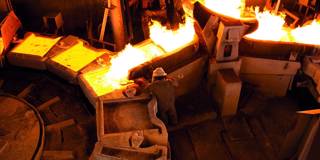The New-Style Energy Crisis
The surge in global demand for energy and other commodities has confronted policymakers and consumers with difficult new economic, political, and strategic realities. Although specific energy-market developments are difficult to predict with any precision, some broader developments are already baked into the cake.
With Russia’s war in Ukraine disrupting commodities markets and further complicating broader geopolitical developments that have been taking shape in recent years, no one is better positioned than Daniel Yergin to offer a sense of the new energy landscape. It is one he has scoped out in his aptly titled new book, The New Map: Energy, Climate, and the Clash of Nations. Also the author of the Pulitzer Prize-winning 1991 book, The Prize: The Epic Quest for Oil, Money, and Power, he is one of the world’s leading authorities on the politics and economics of energy. He recently spoke with Project Syndicate about energy-market developments following the pandemic and Russia’s invasion of Ukraine.
Project Syndicate: There is much debate over whether Russia’s invasion of Ukraine will accelerate the “green” transition or set it back, owing to heightened uncertainty about supplies of hydrocarbons at a time when many economies were already experiencing surging energy prices. Thinking about major economies like the United States, Europe, and China, do you currently give more weight to the “accelerate” scenario or to the “set back” scenario? What policy changes are most likely to tilt the scale one way or the other, and are any of them likely?
Daniel Yergin: The correct answer, I think, is both. There is clearly a new impetus for renewable electricity generation, and that will proceed, as in Europe’s post-invasion REPowerEU program. But it will take time, and it will face some of the same supply-chain difficulties and rising costs as other parts of the economy. “Set back” is not quite the right formulation. Rather, there is also a renewed emphasis on energy security and assuring supplies. The amnesia about that critical security issue is over. Just look at Germany. It is finally committing to roll out new regasification terminals at its ports, without which it cannot import and deploy liquefied natural gas (LNG).
A basic principle of energy security is diversification, and that will loom large for Europe – much larger than it did prior to the Russian invasion.
